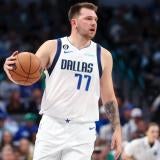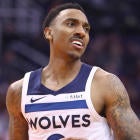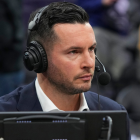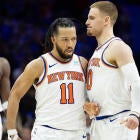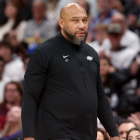
Trades have been sparse in the NBA lately. Since July's blockbuster swap of Chris Paul and Russell Westbrook, there has been only one deal: the Utah Jazz acquiring Jordan Clarkson for Dante Exum. But with the trade deadline now only three weeks away, things may soon be heating up around the league. On Thursday, the Atlanta Hawks and Minnesota Timberwolves have just made the season's second trade.
The Hawks have traded sharpshooter Allen Crabbe to the Timberwolves in exchange for Jeff Teague and Treveon Graham, according to Adrian Wojnarowski of ESPN. The move reunites the Hawks with Teague, their former All-Star point guard whom they traded prior to the 2016-17 season.
Teague spent a year playing for the Indiana Pacers, but has been with the Timberwolves ever since. Crabbe, meanwhile, has spent only the past several months with Atlanta after coming over in a salary dump from the Brooklyn Nets. His deal is set to expire this offseason, so he serves primarily as cap filler here. In immediate terms, one team wins this trade fairly handily, so let's dive into grades for this trade.
Atlanta receives:
Minnesota receives:
Hawks trade grade: A-
Beyond Trae Young, the Hawks had arguably the worst set of backup point guards in the NBA this season. Their primary backup for Young had been Evan Turner, nominally a small forward and functionally more of a secondary ball-handler than an offensive engine. Beyond him, the Hawks have gotten by with a combination of fringe NBA players (Tyrone Wallace, Brandon Goodwin) and occasionally playing other players out of position (Kevin Huerter, DeAndre' Bembry). None of it has worked. The Hawks have been outscored by 14.1 points per 100 possessions in the minutes Young has spent on the bench.
Teague provides immediate relief in that regard. While he will never make another All-Star team and actually been benched in November when a poor shooting stretch coincided with the peak of the point-Andrew Wiggins phenomenon, he is now one of the best backup point guards in the league. His volume has decreased in recent years, but Teague's shooting numbers are nearly identical to his All-Star 2014-15 season. His effective field goal percentage then was 50 percent. This season, it is 49.8 percent.
He had been averaging 6.1 assists per game in Minnesota compared to an Atlanta peak of 7.2, and he is still ranked in the 90th percentile league-wide in terms of pick-and-roll efficiency, per Synergy Sports, as he scores 1.047 points per possession on such plays. The volume is lower, but Teague has been even more efficient than Young on pick-and-rolls this season. It is his bread and butter.
Graham, meanwhile, now finds himself on his fourth NBA team in four seasons. He is mostly a throw-in here, but as throw-ins go, the Hawks could do far worse. Graham has played meaningful rotation minutes for his past three teams as a wing with positional versatility. He can handle the ball a bit, defend passably and even moonlight at power forward in an emergency despite being only 6-5. His shot has kept him from finding more stability in the NBA, but there is at least some evidence to suggest that it can improve. He is a 72 percent free-throw shooter, at least. He was never the target here, but the Hawks can find him some minutes and see if he develops.
In reality, Atlanta gave up absolutely nothing to get Teague and Graham. While Crabbe held a spot in the Hawks' rotation, his only real value came as a shooter. He has made only 32.3 percent of his 3-pointers this season, though, so in reality, teams viewed him as nothing more than an expiring contract. Teague's contract is expiring too, though, so the Hawks merely turned one pricey backup into a better one at a more important position. Getting a flier on Graham is just the icing on the cake.
Timberwolves trade grade: C+
Shooting was certainly a need for Minnesota. While the Timberwolves are third in in the NBA in 3-point attempts per game at 39, they are 29th in percentage at 32.4. On a per-game basis, 28.5 percent of their made 3-pointers were coming from Karl-Anthony Towns, and while having a big man who can shoot is obviously valuable, Towns is obviously too important to Minnesota's offense to dedicate himself that fully to spacing the floor. Ideally, other players should be doing that for him.
Crabbe, theoretically, does so. While he is shooting poorly this season, he made nearly 40 percent of his 3-point attempts in the prior four seasons with Portland and Brooklyn. Steadier minutes on a team with less shooting might be just what he needed to start hitting shots again, and in a contract year, he'll be plenty motivated to perform in Minnesota.
Still, the short-term price here seems a bit excessive. Lacking a backup point guard crippled the Hawks for three months. Now Minnesota only has one point guard on its active roster, Shabazz Napier, along with two-way youngster Jordan McLaughlin. Jarrett Culver handled the ball quite a bit at Texas Tech, but he's struggled enough as a rookie as it is. Forcing him to run the offense isn't going to help matters.
That job has fallen on Andrew Wiggins quite a bit this season, and while the results were initially promising, they have dipped significantly. His field goal percentage has dropped from 46.2 percent in his first 16 games to 40.9 in his last 16. His 3-point percentage, assist and raw point totals have all fallen as well, and while that decline has coincided with Towns' absence, things have gotten significantly worse of late. After missing four games due to illness, Wiggins is averaging only 14 points on less than 38 percent from the field in his past six games.
The Timberwolves seem to know that their point-Wiggins experiment isn't sustainable. The Ringer's Kevin O'Connor reported shortly after this trade that Minnesota is looking around for a replacement point guard, and was recently rebuffed on an inquiry for Indiana Pacers sophomore Aaron Holiday. Minnesota has previously been linked to D'Angelo Russell as well, but offering for Holiday indicates that the Timberwolves would prefer not to surrender major assets (such as top defender Robert Covington) for a young point guard.
That's a prudent strategy for the long haul, but it doesn't explain why Minnesota would trade Teague without a replacement waiting in the wings. This trade would have made far more sense if a replacement point guard was coming from a third team. But now, even if it only takes until the trade deadline, the Timberwolves are going to have to play quite a few minutes without a point guard on the floor. We saw what that did to Atlanta, so expect the losses to pile up as the Timberwolves look for their floor general of the future.










